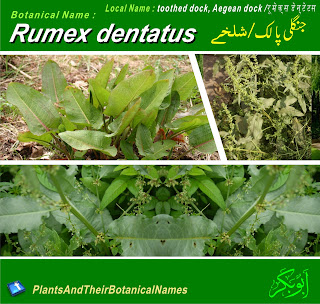Rumex dentatus
Family....Polygonaceae..
Herb.....Common Names...toothed dock, Aegean dock
Urdu..... Jungli Palak..جنگلی پالک
....ضرس العجوز...........arbic....
Hindi.....रूमेक्स डेन्टेटस
Pashto ......Shalkhay / شلخے
Rumex dentatus, commonly known as toothed dock or toothed sorrel, is a perennial herbaceous plant belonging to the family Polygonaceae. It is native to parts of Europe, North Africa, and Asia. Toothed dock is a widespread and adaptable plant that can be found in various habitats, including fields, meadows, waste areas, and roadsides.
Here are some key characteristics and features of Rumex dentatus:
1. Appearance: Toothed dock typically grows up to 30 to 60 centimeters (12 to 24 inches) tall and has a slender, erect stem. The leaves are lanceolate or oblong in shape and have pronounced toothed edges, which give the plant its common name "toothed dock."
2. Flowers: The flowers of Rumex dentatus are small and inconspicuous, arranged in dense, elongated clusters known as racemes. They are typically greenish to reddish-brown in color. The plant flowers from late spring to early summer.
3. Habitat: Toothed dock is a versatile plant that can thrive in various environments. It can be found in open grasslands, disturbed areas, along roadsides, and in agricultural fields. It prefers well-drained soils and can tolerate both full sun and partial shade.
4. Edibility: Some species of the Rumex genus, including Rumex acetosa (common sorrel), are edible and used as a culinary herb or salad green. However, it's important to note that Rumex dentatus is not widely used for culinary purposes, and its edibility is not well-documented. As with any wild plant, caution should be exercised, and proper identification is essential before consumption.
5. Medicinal Uses: In traditional medicine, some species of Rumex have been used for their potential medicinal properties, such as treating digestive disorders or skin conditions. However, there is limited scientific evidence supporting these claims, and self-medication with wild plants is not recommended without expert guidance.
6. Wildlife Benefits: Toothed dock provides food and habitat for various wildlife, including insects and birds. The plant's seeds are a food source for some bird species.
7. Weed Status: In certain regions, Rumex dentatus is considered a weed due to its ability to spread and compete with other plants in cultivated areas. It can be challenging to control, especially in agricultural settings.
Overall, Rumex dentatus is an interesting and adaptable plant with toothed leaves that can be found in diverse environments. While some species within the Rumex genus have historical culinary and medicinal uses, the specific uses and safety considerations for Rumex dentatus are not as well-established. As with any wild plant, it's crucial to exercise caution and seek expert advice before using it for any purpose.





No comments